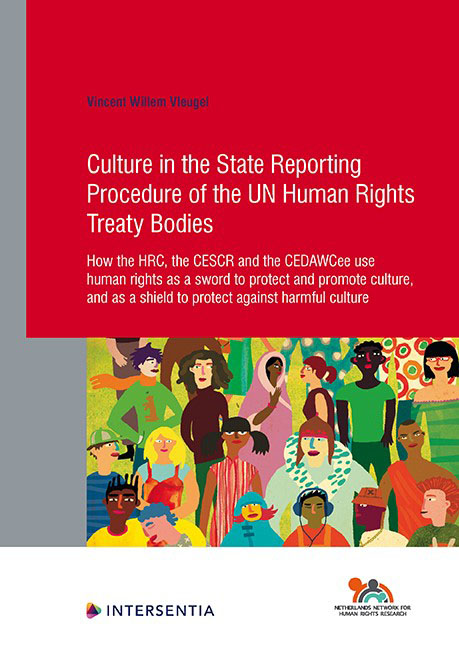 Culture in the State Reporting Procedure of the UN Human Rights Treaty Bodies
Culture in the State Reporting Procedure of the UN Human Rights Treaty Bodies Published online by Cambridge University Press: 11 November 2021
INTRODUCTION
The aim of this chapter is to explain the monitoring procedures with which the treaty bodies can oversee implementation of the treaty provisions by States parties: the State reporting procedure, and the adoption of general comments or recommendations. It describes the working methods of the treaty bodies to fulfil their function of monitoring and supervising the implementation of States parties’ obligations under the treaties, and clarifies the treaty bodies’ role in the interpretation of the scope, content, and application of treaty norms. This is important because these procedures enable the treaty bodies to monitor and evaluate the implementation of human rights obligations by States, and thereby to find a balance between the universality of the rights embodied in their respective treaties and their local and culture-specific implementation. A basic understanding of the composition, working methods and mandates of the treaty bodies is essential for understanding the following chapters, which provide an overview of the obligations of States to respect and foster positive aspects of culture as well as to promote change and elimination of negative or harmful aspects of culture, which come to the fore in the State reporting procedure (‘concluding observations’), and in general comments or recommendations.
After a brief introduction of the three treaties and the substantive rights which they cover (section 2), the three monitoring bodies, the Committees, are introduced, with an overview of their composition, meeting schedule and decision-making processes (section 3). In the subsequent section, their working methods are examined (section 4). The final sections deal with the legal status of the treaty bodies’ output (section 5), the different legitimacy challenges which the treaty bodies are facing (section 6), and the potential role of treaty bodies in reconciling the universality of human rights with cultural diversity, in particular according to (some of) the authors discussed in chapter 2 (section 7).
THE TREATIES
The Universal Declaration of Human Rights (UDHR) is widely considered to be the foundation of international human rights law, and the source of inspiration for a rich body of legally binding international human rights treaties.
To save this book to your Kindle, first ensure [email protected] is added to your Approved Personal Document E-mail List under your Personal Document Settings on the Manage Your Content and Devices page of your Amazon account. Then enter the ‘name’ part of your Kindle email address below. Find out more about saving to your Kindle.
Note you can select to save to either the @free.kindle.com or @kindle.com variations. ‘@free.kindle.com’ emails are free but can only be saved to your device when it is connected to wi-fi. ‘@kindle.com’ emails can be delivered even when you are not connected to wi-fi, but note that service fees apply.
Find out more about the Kindle Personal Document Service.
To save content items to your account, please confirm that you agree to abide by our usage policies. If this is the first time you use this feature, you will be asked to authorise Cambridge Core to connect with your account. Find out more about saving content to Dropbox.
To save content items to your account, please confirm that you agree to abide by our usage policies. If this is the first time you use this feature, you will be asked to authorise Cambridge Core to connect with your account. Find out more about saving content to Google Drive.